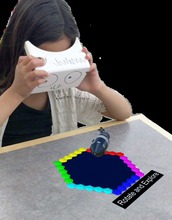Media Advisory 17-013
Future consumer technology from NSF at CES 2018 Eureka Park
From synthetic voices to virtual tutors, NSF-funded startups showcase tech at world's largest consumer technology event

NSF awards about $200 million annually to startups and small businesses.
December 20, 2017
This material is available primarily for archival purposes. Telephone numbers or other contact information may be out of date; please see current contact information at media contacts.
Nearly 20 small businesses funded by the National Science Foundation (NSF) will showcase their early stage technologies at the 2018 CES, a global conference that unveils up-and-coming consumer technologies.
The companies will be featured at the Eureka Park Marketplace, an area of CES dedicated to pre-market technologies born from fundamental science and engineering innovation.
NSF cofounded Eureka Park in 2012 to help NSF-funded entrepreneurs with emerging, ready-for-commercialization technology to gain marketplace exposure by giving them access to potential partners and investors at CES. Since then, Eureka Park has become one of the most popular exhibit spaces, and now features more than 800 companies, including 16 funded by NSF.
The small businesses exhibiting at CES 2018 will showcase cutting-edge technologies designed to address challenges in health and wellness, virtual reality, the Internet of Things, and many other areas.
CES Attendees: Visit NSF booth #50322 for more information.
NSF awards about $200 million annually to startups and small businesses through America's Seed Fund powered by NSF, also known as the NSF Small Business Innovation Research (SBIR)/Small Business Technology Transfer (STTR) program, which transforms scientific discovery into products and services with commercial and societal impact.
WHAT: Startups and small businesses will demonstrate their pre-market or new-to-market technologies to thousands of CES attendees.
WHEN: Jan. 9-12, 2018
WHERE: Eureka Park Marketplace, Sands, Level 1, Hall G, Las Vegas
WHO: NSF-funded small businesses in Eureka Park include the following:
Cyber & Personal Security
Gigavation Incorporated, advanced cryptography to develop technologies that are disrupting Internet of Things security and providing unified biometric-based authentication without storing biometric information.
Education Technology
LightUp (@lightup), a virtual tutor powered by augmented reality and artificial intelligence to make a personalized education more widely available.
TheBeamer LLC (@TheBeamerLLC), customizable educational adventure video game with the theme "We are made of stardust that was once in the body of Albert Einstein and the last T-Rex."
TutorGen, Inc. (@TutorGen), Student-Centered Adaptive Learning Engine (SCALE) follows a human-centered, data-driven approach to provide a personalized and adaptive experience for learners using training software.
Environmental Monitoring
Arable Labs Inc. (@ArableLabs), advanced Internet of Things device collects rich data on microclimate and crop growth to drive predictions of timing quality and yield and reduce supply chain risk in food and agriculture.
K&A Wireless LLC (@sensorcommtech), an Internet of Things-based mobile pollution monitoring system (Wi-NOx) for transportation and smart city segments with data surety at its core.
Health & Wellness
Neural Analytics (@NeuralAnalytics), a complete platform for non-invasive brain health assessment.
VocaliD, (@VocaliDinc), custom digital voices created using proprietary voice blending algorithms that pull from a database of more than 20,000 voices from contributors from around the world.
Intellectual Property
PatentDive Inc. (@PatentDive), software for invention disclosure and rapid patent drafting.
Modeling & Visualization
Pointivo (@Pointivo), a cloud-based computer vision algorithm that uses machine learning to create 3-D models from video and photos.
ViSUS LLC (@visoarex) fast reading and writing of 2-D, 3-D or multidimensional grid data for collaborative analytics and visualization, such as real-time stitching of massive aerial image mosaics.
Transportation
TriboTEX (@tribotex), a "smart" nanoparticle technology reverses wear in engines by finding worn surfaces and placing a diamond-like coating on them.
Virtual Reality
Hauoli, more accurate, low-cost and easy to use motion tracking technology to revolutionize how users interact with the world.
NGCodec Inc. (@NGCodec), video compression provides consumers with desktop-level performance of virtual reality in head-mounted displays by leveraging the cloud.
Sun Innovations (@SunsInnovations), a display technology that converts any glass window to a fully transparent digital panel with unlimited viewing angles.
Tactical Haptics (@TacticalHaptics), touch-feedback systems that deliver a realistic sense of touch in virtual reality.
-NSF-
-
Nanoparticle technology designed to reverse wear in engines by coating worn surfaces.
Credit and Larger Version -
Iris-based authentication to help secure computers, mobile devices and networks.
Credit and Larger Version -
Custom synthetic voices to make communication more human.
Credit and Larger Version -
Educational science games that can be easily customized by teachers.
Credit and Larger Version
Media Contacts
Sarah Bates, NSF, (703) 292-7738, email: sabates@nsf.gov
The U.S. National Science Foundation propels the nation forward by advancing fundamental research in all fields of science and engineering. NSF supports research and people by providing facilities, instruments and funding to support their ingenuity and sustain the U.S. as a global leader in research and innovation. With a fiscal year 2023 budget of $9.5 billion, NSF funds reach all 50 states through grants to nearly 2,000 colleges, universities and institutions. Each year, NSF receives more than 40,000 competitive proposals and makes about 11,000 new awards. Those awards include support for cooperative research with industry, Arctic and Antarctic research and operations, and U.S. participation in international scientific efforts.
Connect with us online
NSF website: nsf.gov
NSF News: nsf.gov/news
For News Media: nsf.gov/news/newsroom
Statistics: nsf.gov/statistics/
Awards database: nsf.gov/awardsearch/
Follow us on social
Twitter: twitter.com/NSF
Facebook: facebook.com/US.NSF
Instagram: instagram.com/nsfgov






